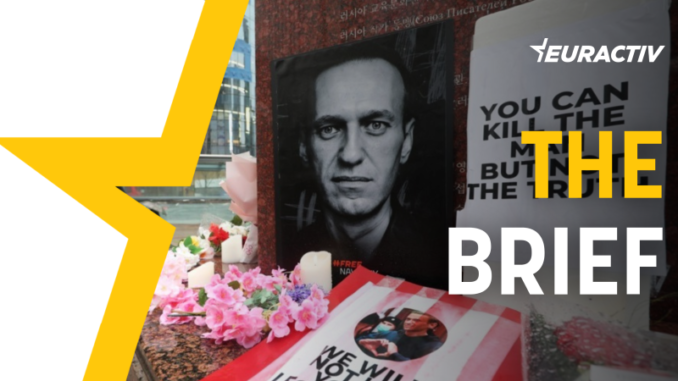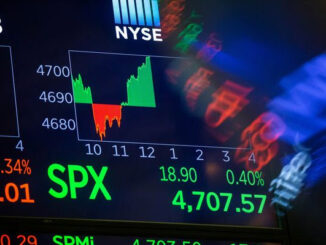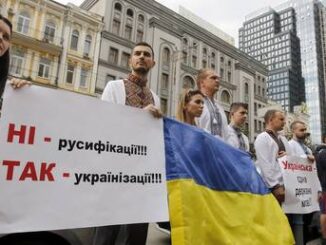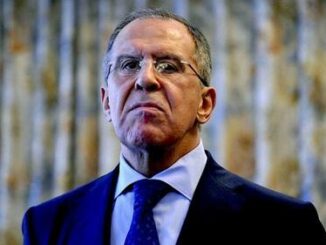
On 18 March 2016, Russian dissident Alexei Navalny participated in a live TV debate with Vladimir Pozner, one of Russia’s most famous journalists, on the issue of media censorship.
The debate, broadcast by the independent Russian network TV Rain, has since been viewed almost nine million times on YouTube. It provides profound insight into the nature of Russia’s media system and also offers important lessons about the kind of person Navalny was — and why he was eventually killed.
Near the start of their discussion, Pozner, who at the time hosted Russian state TV’s flagship ‘high-brow’ interview show, made a remarkably candid admission.
“Of course, I would invite you [Navalny] on my show,” Pozner said. “There are a number of other people I would invite. But I can’t. I say that completely openly.”
After Navalny expressed amazement at his interlocutor’s “bold statement”, Pozner clarified that he hadn’t “seen any list”.
“But you know a number of names [of people who can’t be invited]?” Navalny asked.
“Yes,” Pozner replied.
Navalny argued that such a restriction is tantamount to censorship. Pozner denied it. The physical existence of a “blacklist”, he argued, is a prerequisite for true censorship.
Putting aside this philosophical (or, depending on your viewpoint, merely semantic) issue, Pozner’s revelation is certainly extraordinary: akin to, say, BBC presenter Stephen Sackur admitting live on ITV that he is effectively barred from inviting political dissidents onto HARDtalk.
Perhaps even more remarkable than the confession itself was the fact that Pozner suffered no negative professional consequences for making it. Indeed, Pozner’s show continued to air for the next six years, with the last episode broadcast on 21 February, 2022: just three days before Russia’s full-scale invasion of Ukraine.
Such facts underscore a key feature of Russian state media that is often underappreciated in the West.
As the Ukraine-born British journalist Peter Pomerantsev pointed out in his 2014 memoir, Nothing Is True and Everything Is Possible: Adventures in Modern Russia, Russian propaganda — unlike the Soviet kind — is suffused with an ironic, postmodern, almost surreal quality.
There are indeed clear restrictions on what you can and can’t say, and on which guests can and cannot be invited onto news programmes. But the fact that such restrictions exist is not restricted. The censorship is itself uncensored.
A second key moment came when Pozner attempted to justify his decision to work for Russian state TV.
“Look, we live and work in these conditions,” Pozner said.
“We need to fight for better conditions,” Navalny replied.
“Who’s arguing?” Pozner said.
In other words, both Pozner and Navalny — top state TV journalist and key political dissident — agreed that Russia’s media system was in need of reform.
Their disagreement ultimately hinged on whether the current system was unrestricted enough to permit at least some useful journalistic activity. Pozner believed that it was. Navalny believed that it wasn’t.
To be sure, much of Pozner’s journalism was emotionally impactful. Witness, for instance, his deeply moving 2009 interview with former US ambassador to Russia John Beyrle, at the end of which Beyrle nearly breaks down in tears remembering his father, an American who was injured fighting for the Red Army during World War 2.
Politically, however, Pozner’s journalism was effectively worthless. To give just one notable example, in a 2012 interview with former Russian president Dmitri Medvedev, Pozner failed to ask his guest a single question about corruption — an evasion Pozner attempted to justify by claiming that he wouldn’t have received “any concrete answer”.
Contrast this with Navalny, who published a searing exposé of Medvedev’s personal corruption in 2017, and went on to do the same for President Vladimir Putin in 2021 — just months after Putin reportedly tried to poison him.
Navalny, in other words, was both a true journalist and an idealist. He rejected any restrictions on his journalistic freedom and categorically refused to participate in a media system that he regarded as irredeemable.
“In a time of universal deceit, telling the truth is a revolutionary act,” George Orwell once wrote. This has always been especially true in Russia — where the truth is revolutionary and often fatal. As evidenced by Navalny’s death in prison on 16 February.
Today’s edition is powered by the Party of European Socialists
The Europe we want: social, democratic, sustainable
Join us for the Election Congress of the Party of European Socialists, where we will elect the PES Common Candidate and adopt the PES manifesto for the 2024 European elections.



